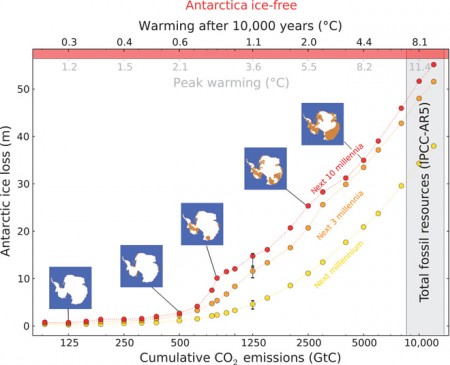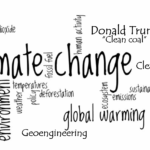September 18, 2015 – If the entire Antarctic continent were to melt it would add 58 meters (190 feet) to world sea levels. The real question is how much additional carbon in the atmosphere would be needed for this scenario to play out? Based on new research appearing in the open source journal Science Advances we would have to release most of the carbon assets discovered to date into the atmosphere to yield a sea level rise of 3 meters (approximately 10 feet) per century for the next millennium. That would be the immediate impact. The longer term, over 10 millennia would yield the 58 meter rise.
What would inhibit sea levels from rising faster in this century? Antarctica’s contribution to sea level rise based on this latest research is estimated to be no more than 14 centimeters (about 5.5 inches) based on current carbon burn rates. The rising temperatures in Antarctica are increasing the moisture holding capacity of the polar region which is resulting in higher snowfalls and marginal increases in sea ice. Hence the impact on sea levels is marginal throughout the 21st century.
But the longer term projections show that staying the course with carbon emissions will ultimately eliminate the Antarctic Ice Sheet and that warming beyond 2 degrees Celsius as a target will have millennial-scale consequences as sea levels rise tens of meters over the next one thousand years.
So we have a conundrum. For politicians and policy wonks addressing carbon emissions it seems that sea level shouldn’t be a big problem as we approach mid-century and beyond.
Why do anything then? After all the consequences of our current acts won’t significantly impact the planet for more than a century. And if this study’s models prove right the real consequences are as much as a millennia away. By that time won’t we have new technology to mitigate and adapt to our changing planet, or even the means to geo-engineer it back to pre-Industrial Revolution levels of atmospheric carbon?
The act of reducing our carbon footprint now requires humanity to fundamentally change our view from short to long term. Yet all of our politics is structured around two, four or five-year election cycles. How do you reconcile the two? That will be our challenge at Paris 2015 and in the ensuing years ahead.











[…] New Climate Study States Sea Level Rise This Century Will be Minimal […]